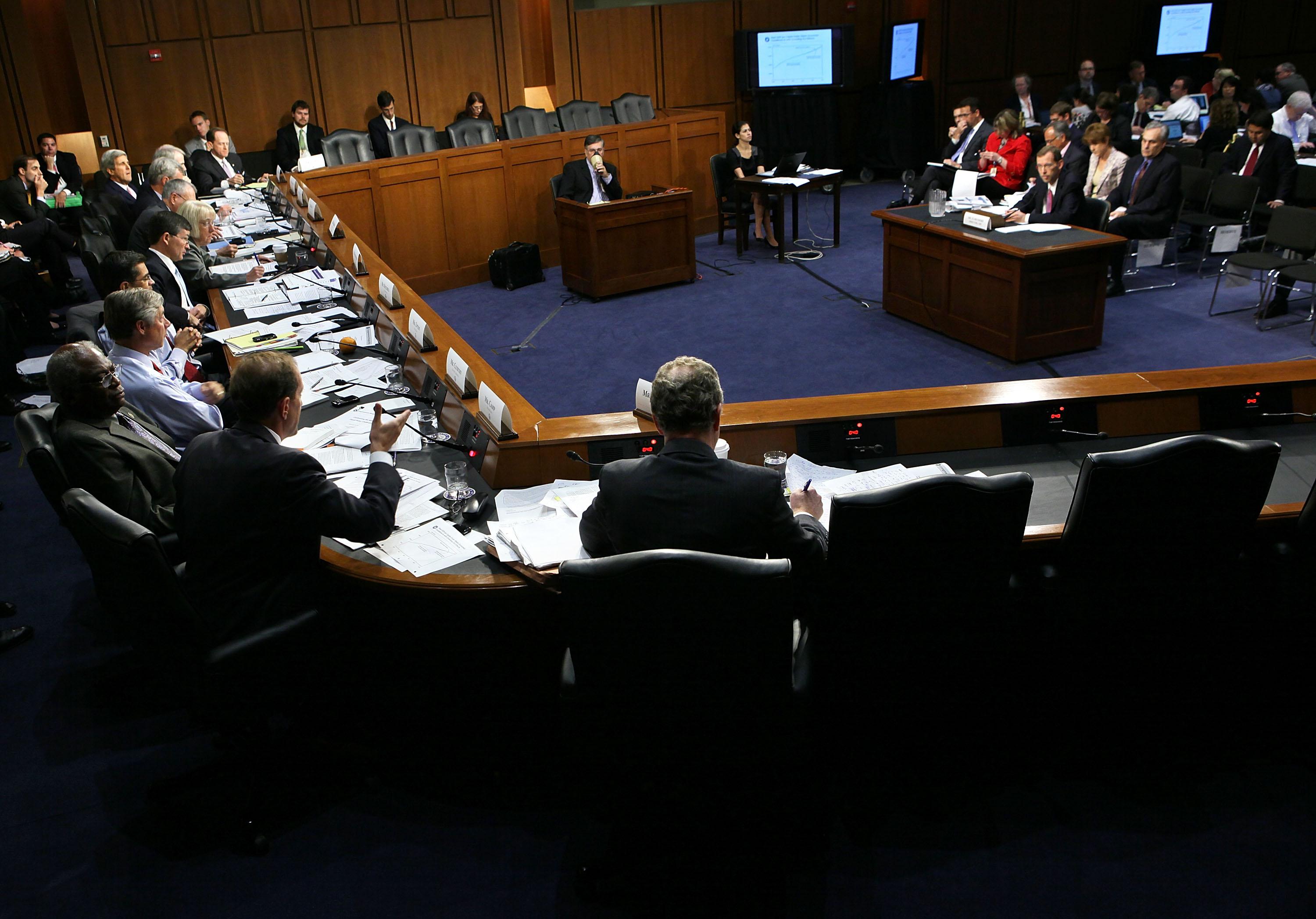Today’s the day when Washington officially comes to terms with the fact that the “Supercommittee”—a bipartisan, bicameral group charged with reducing America’s long-term fiscal deficit—won’t agree on anything. This is being termed a “failure,” and by the standards of D.C.’s fetishization of bipartisanship, it is one. But in terms of deficit reduction, failure is actually better than success.
For starters, the whole premise of the Supercommittee was that if it didn’t agree on something, then $1.2 trillion of spending cuts would be quasi-automatically implemented through a mechanism known as “sequestration.” The cuts are balanced 50-50 between the security and nonsecurity sides of the budget. And while they’re hardly irreversible, neither is anything else in American law. It’s not possible for Congress to metaphysically commit future Congresses to future courses of action. But what Congress did to resolve the debt-ceiling standoff was to change the default rule. The $1.2 trillion in cuts will happen unless Congress and the president act affirmatively to stop them from happening. In an American political system bogged down by bicameralism, the filibuster, and the presidential veto, the default rules matter a great deal. So if it’s $1.2 trillion in spending cuts you want, then $1.2 trillion in cuts were already put on the schedule by the debt-ceiling deal. That the supercommittee didn’t agree on an alternative to the cuts doesn’t make it any more (or less) likely that the full Congress will somehow repeal them.
From a pure deficit-hawk point of view, the best news about the supercommittee deadlock is on the tax side. Here, again, it all comes down to default rules. When the Bush administration was passing its tax cuts back in 2001 and 2003, it reduced their headline cost by scheduling them to expire. Republicans, of course, never intended the tax cuts to expire and regard letting the scheduled expiration happen as a form of “tax increase.”
The universe in which the Republicans get their way and the cuts are extended is part of what the Congressional Budget Office calls the “current policy baseline.” The universe in which all the tax cuts expire as currently scheduled is part of what the CBO calls the “current law baseline.” Where things get tricky is that the Democrats don’t favor either the current-law baseline or the current-policy baseline. Instead, their preference is to extend the so-called “middle class” elements of the Bush tax package, even though these tax cuts are heavily slanted toward the richest taxpayers. The Democrats want to let only those portions of the tax package expire that exclusively benefit the wealthy.
The entire argument about tax increases thus has to be understood relative to different baselines. The Democrats’ preference is a tax increase relative to current policy but a tax cut relative to current law. Under the way the supercommittee was set up, if the Republican members had somehow caved and given the Democrats what they wanted on revenue—ending Bush tax cuts for the rich, maintaining them for the middle-class—that would have “scored” as a large tax increase even though from another point of view it would have been a large tax cut. What’s more, nobody ever thought it was plausible that Republicans would fully cave. If the supercommittee “succeeded,” it would have meant compromising between Obama’s large tax cut and the GOP’s humongous tax cut, and then agreeing to count it as a tax increase. That fake tax increase, meanwhile, would have offset some of the spending cuts that are now scheduled to take place.
By failing, in other words, not only did the Supercommittee preserve a larger set of spending cuts than would have been enacted if they succeeded, they preserved the current-law baseline. That means that if the White House follows through on its threat to veto any full extension of the Bush tax cuts, we’ll get both more tax increases and more spending cuts than we would have if they’d succeeded.
The main reason to worry about the Supercommittee’s failure actually has nothing to do with the deficit. Back during the lame-duck session of the 110th Congress, the administration agreed to a temporary full extension of the Bush tax cuts in exchange for some stimulative measures such as a temporary payroll tax cut and an extension of unemployment-insurance benefits. Those measures are now, like the Bush tax cuts, set to expire. There’d been some thought that the Supercommittee mechanism might be a vehicle to extend those stimulus items and offset the cost with longer-term deficit reduction. That’s the fiscal policy mix most economists think we need right now: stimulus spending causing a bigger deficit in the short-term paired with credible plans for longer-term debt reduction. With the Supercommittee deadlocked, the odds of stimulus extensions look bleak, which means that next year federal policy will be a major drag on growth. Government spending will be declining even as payroll taxes rise and exports to Europe will likely fall. That’s more bleak news for the struggling American worker but if anything, further confirmation that Washington’s professional deficit-scold class shouldn’t regret the Supercommittee’s failure.
